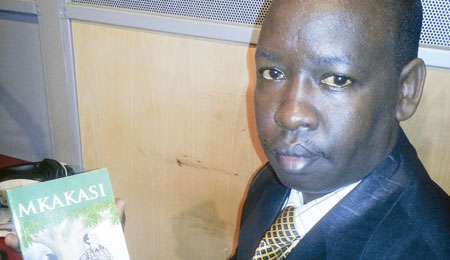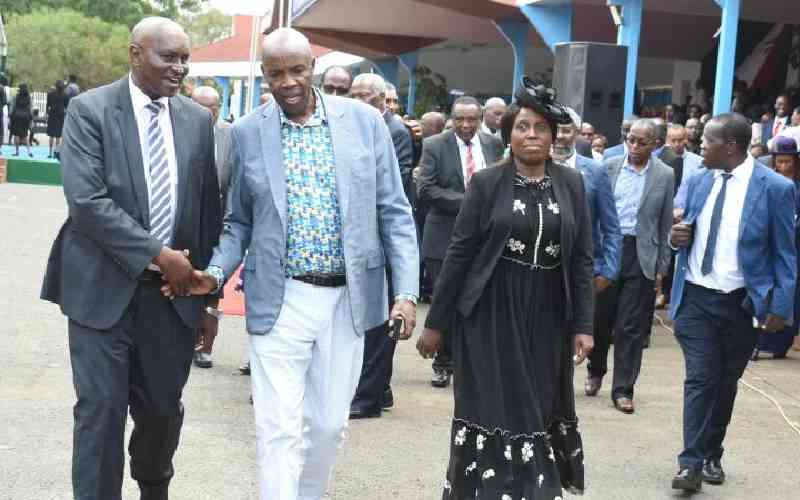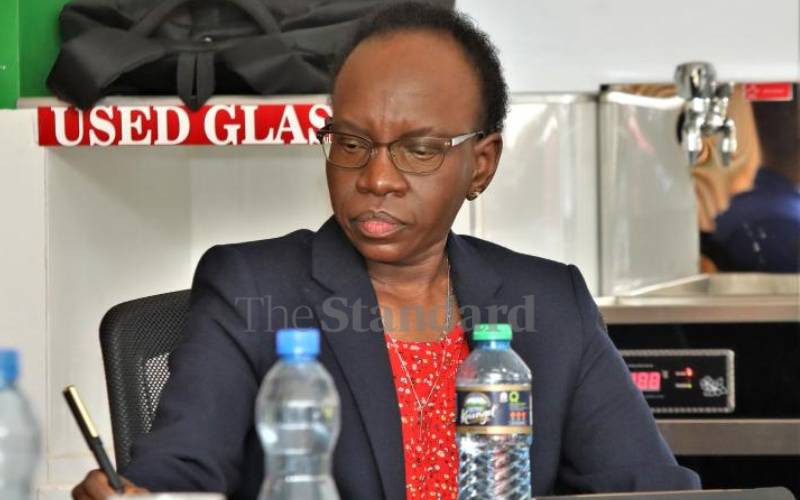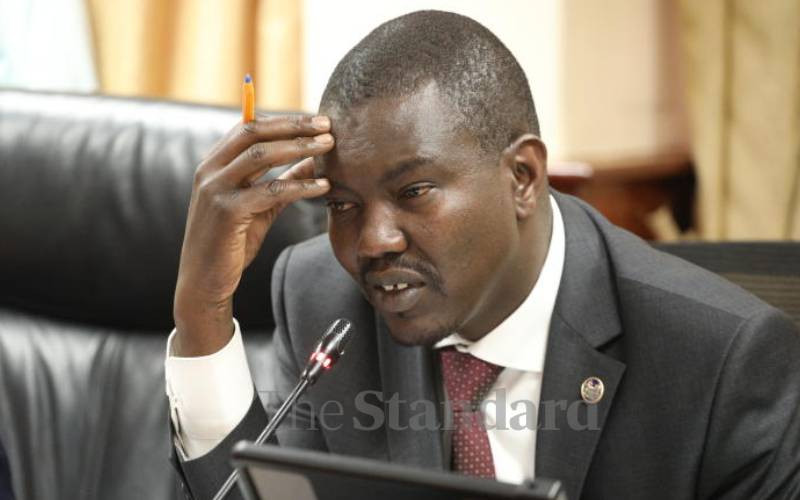 |
|
Scribe Geoffrey Mung’ou displays a copy of the novel, Mkakasi. [PHOTO: DANIEL PSIRMOI/ STANDARD] |
By Daniel Psirmoi
There is a notion by a section of scholars that Journalism may be in one way or another graveyard for Literature. They argue that joining Journalism by a literary scholar would kill one’s career.
Geoffrey Mung’ou, however, is proving the proponents of this view wrong by juggling both careers with relative ease. The radio journalist with The Standard Group, who is also a trained Literature teacher, has his first Swahili novel, Mkakasi, selling in major bookstores in the country. The 210-page book published by Jomo Kenyatta Foundation is cleverly woven on themes like education, religion, HIV and Aids, love, jealousy, promiscuity, hypocrisy, conflict, and youth unemployment, among others.
The novel also discusses the incessant strikes in higher institutions of learning. In the book, which he started writing while a student at Kenyatta University, he delves into the current affairs and manages to tell it all in attractive and captivating Swahili. Mungou’s target readerships are students both in secondary schools and universities.
“I recommend that whoever wants to enrich his grip of the Swahili language should grab a copy of Mkakasi and read its contents,” he advises. Growing up in Kapsokwony, Mt Elgon, Mung’ou says his childhood dream was to be a radio presenter. He recalls imitating more than 30 news anchors of yore, including Khamis Themo, David arap Maiyo, Willy Mwangi, Ishmael Mohamed, Badi Muksin, the late Jacob William Maunda, Elias Magembe, Mwamoyo Hamsa and Tom Atandi, to the amusement of his peers and parents.
“My proficiency in the language was inspired by listening to the radio as I grew up as a child in the late 80s and 90s,” he adds.
Currently, he is radio presenter at the Radio Maisha. According to Mung’ou, he was bitten by the writing bug when he joined high school after reading Siku Njema, a literature set book by Ken Walibora Waliaula, a journalist-turned author and now Swahili school
Swahili grammar
Mung’ou associates his competence of Swahili grammar to the effort of great scholar of the time — Wallah Bin Wallah. However, it is after he joined Kenyatta University in 2003 to study Bachelor of Arts in Education, majoring in Kiswahili and history that he started actualising his dream by putting ink onto paper. He tried to pen his first novel though he was discouraged by some of his friends who alleged that his origin Mt Elgon could never be associated with Swahili. “I started penning Mkakasi in 2003, when we had a long break occasioned by a lecturers’ strike. I finished a year later but it was rejected by over four publishers who showed contempt even before perusing through my manuscript. Others up to date have never even bothered to give me a reason why they rejected my work,” says Mung’ou, a two-time winner of the WASTA Awards (2011 and 2012). The awards are given in recognition of those committed to the advancement of Swahili in various spheres.
He adds that the new crop of writers have great potential and gives an example of Jeff Mandila, a young writer who won an award in the Wahome Mutahi Literary Prize in 2012 with his maiden Swahili novel Sikitiko La Sambaya. Mung’ou has finished working on three other books; one, which he says, may rattle Swahili scholars.
Hamisi Omar Babusa, his former lecturer at Kenyatta University and Swahili scholar who has read Mung’ou’s debut book made the following comments:
“Mkakasi ni riwaya babukubwa inayoakisi masuala ibuka, yakiwamo yale yanayowahusu vijana, sikwambii uozo wa jamii, (Mkakasi is a masterpiece that dwells on the current happenings and affairs, includ ing what bugs the young people and moral decay in the society)’’.
To enhance learning of Kiswahili as a language, Mung’ou has a programme on Radio Maisha — ‘Nuru ya Lugha’ with Hassan Mwana wa Ali every Saturday from 8am to 11am.
Stay informed. Subscribe to our newsletter
 The Standard Group Plc is a
multi-media organization with investments in media platforms spanning newspaper
print operations, television, radio broadcasting, digital and online services. The
Standard Group is recognized as a leading multi-media house in Kenya with a key
influence in matters of national and international interest.
The Standard Group Plc is a
multi-media organization with investments in media platforms spanning newspaper
print operations, television, radio broadcasting, digital and online services. The
Standard Group is recognized as a leading multi-media house in Kenya with a key
influence in matters of national and international interest.
 The Standard Group Plc is a
multi-media organization with investments in media platforms spanning newspaper
print operations, television, radio broadcasting, digital and online services. The
Standard Group is recognized as a leading multi-media house in Kenya with a key
influence in matters of national and international interest.
The Standard Group Plc is a
multi-media organization with investments in media platforms spanning newspaper
print operations, television, radio broadcasting, digital and online services. The
Standard Group is recognized as a leading multi-media house in Kenya with a key
influence in matters of national and international interest.










